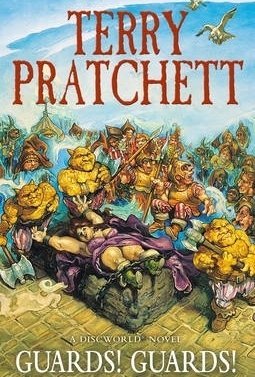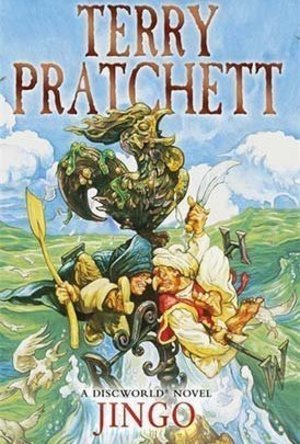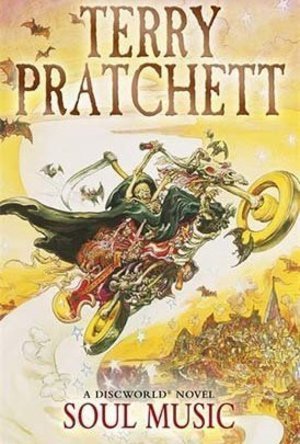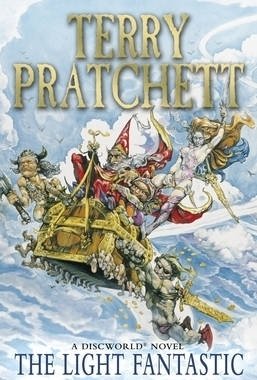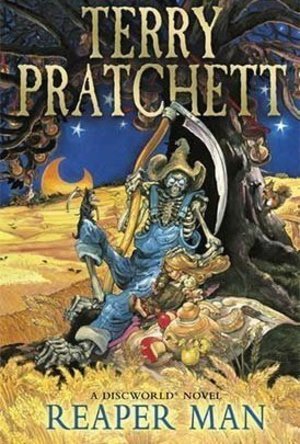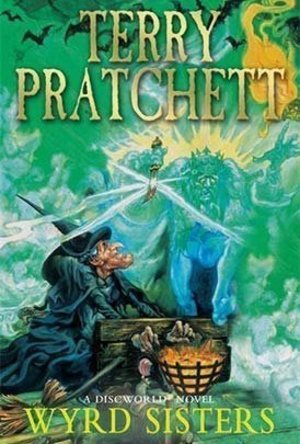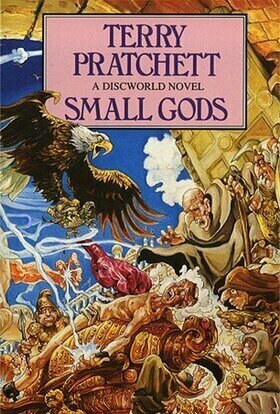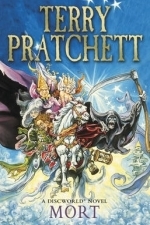Search
Cori June (3033 KP) rated Guards! Guards! Discworld Novel 8 in Books
Dec 3, 2018 (Updated Jun 16, 2021)
Sam Vines (2 more)
wit
L-space
I've reread the book, its been a couple of years. As an introduction to Discworld this is a good place to start. I really enjoy the fact that you don't have to read the Discworld series in order to grasp the main themes and ideas, most of the story arcs are self contained.
Samuel Vines is one of my favorite characters.
If you want a popular fantasy trope(s) flipped on its head this is a great series to read. Funny and surprisingly deep this story is an enjoyment for all. It's an adult book and it does deal with some dark things like alcoholism and other adult themes, but I'd let my nephews read it or I'd read it to them.
Samuel Vines is one of my favorite characters.
If you want a popular fantasy trope(s) flipped on its head this is a great series to read. Funny and surprisingly deep this story is an enjoyment for all. It's an adult book and it does deal with some dark things like alcoholism and other adult themes, but I'd let my nephews read it or I'd read it to them.
David McK (3705 KP) rated Jingo (Discworld, #21; City Watch, #4) in Books
Jan 9, 2022
It's hard to pick your favourite Discworld book.
It's hard even to pick your favourite that utilises a core set of characters.
If I was asked for my favourite Witches book, it would be a toss up between 'Lords and Ladies' and 'Maskerade'. My favourite stand-alone? Probably 'Small Gods'. My favourite Death? 'Soul Music'.
My favourite City Watch? Quite possibly this one.
It's hard even to pick your favourite that utilises a core set of characters.
If I was asked for my favourite Witches book, it would be a toss up between 'Lords and Ladies' and 'Maskerade'. My favourite stand-alone? Probably 'Small Gods'. My favourite Death? 'Soul Music'.
My favourite City Watch? Quite possibly this one.
David McK (3705 KP) rated Soul Music (Discworld, #16; Death, #3) in Books
Jul 1, 2024
You gotta love a bit of Terry Pratchett.
Only he could take The Grim Reaper, and turn him into not-so-much a figure of fun, but use him to examine life and mortality and the nature of human existence.
I think there's five such books in which he takes a starring role in the entire Discworld series - those would be (in order) 'Mort', 'Reaper Man', this one, 'Hogfather' and 'Thief of Time'], with all but the first featuring the Death of Rats ("SQUEEK"), and with the latter three also featuring his grand-daughter Susan.
That, thus, makes this the first novel to do so, with plenty of puns and jokes around the music industry here as a new force comes into being on the Discworld: that of "Music with Rocks In".
For my money, this is top-tier Pratchett.
Only he could take The Grim Reaper, and turn him into not-so-much a figure of fun, but use him to examine life and mortality and the nature of human existence.
I think there's five such books in which he takes a starring role in the entire Discworld series - those would be (in order) 'Mort', 'Reaper Man', this one, 'Hogfather' and 'Thief of Time'], with all but the first featuring the Death of Rats ("SQUEEK"), and with the latter three also featuring his grand-daughter Susan.
That, thus, makes this the first novel to do so, with plenty of puns and jokes around the music industry here as a new force comes into being on the Discworld: that of "Music with Rocks In".
For my money, this is top-tier Pratchett.
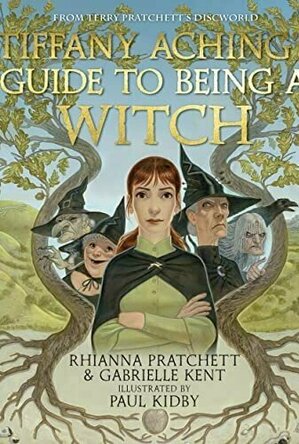
Tiffany Aching's Guide to Being a Witch
Book
"They say you don't find witchcraft, it finds you . . ." An illustrated and practical guide to...
Sarah (7800 KP) rated The Light Fantastic: Discworld Novel 2 in Books
Jul 27, 2017
Absolutely bonkers
This is possibly one of the craziest adventure books I've ever read, and I wouldn't expect any less of a Discworld book. It's bonkers, funny and such an entertaining read. Rincewind has really grown on me too as a character, although I don't feel Twoflower's eccentricities were highlighted quite as much in this book as in The Colour of Magic. Such a fun read.
Britt Smith (36 KP) rated The Light Fantastic: Discworld Novel 2 in Books
Mar 13, 2018
Yet again, this second part to The Color of Magic was absolutely brilliant. I marvel at Pratchett's ability to make me smile each and every page, while still giving forth characters that I can feel attached to. Marked as one of my favorite books, I will no doubt return to this one even as I make my way through all the novels of the Discworld.
Sarah (7800 KP) rated Reaper Man (Discworld, #11; Death, #2) in Books
Mar 23, 2018
Not enough Death
I had high hopes for this book as Death is one of my favourite characters, but sadly it was a bit of a letdown.
Don't get me wrong, it isn't a bad book and is still quite good, it just isn't on par with a lot of the other Discworld books that I've read. Death is a fantastic character but he just isn't featured in this book enough (despite it being about life and death). The wizards and Windle Poons are featured more heavily and sadly they're not quite as loveable. They're funny in their own way, but they get a little rambling after a while. The plot too suffers from rambling as well and the whole concept is a little bit too bonkers, even for a Discworld novel.
It's still a good book and easy to read, it just isn't one of the best in the series.
Don't get me wrong, it isn't a bad book and is still quite good, it just isn't on par with a lot of the other Discworld books that I've read. Death is a fantastic character but he just isn't featured in this book enough (despite it being about life and death). The wizards and Windle Poons are featured more heavily and sadly they're not quite as loveable. They're funny in their own way, but they get a little rambling after a while. The plot too suffers from rambling as well and the whole concept is a little bit too bonkers, even for a Discworld novel.
It's still a good book and easy to read, it just isn't one of the best in the series.
David McK (3705 KP) rated Wyrd Sisters (Discworld, #6; Witches #2) in Books
Apr 18, 2022
The Scottish Play, Discworld style!
(From the blurb):
"Witches are not by their nature gregarious, and they certainly don't have leaders. Granny Weatherwax was the most highly-regarded of the leaders they didn't have. But even she found that meddling in royal politics was a lot more difficult than certain playwrights would have you believe ... "
An early Discworld novel (only #6 in a series that has just reached the 40 mark), this is also only the second appearance of Granny Weatherwax (after Equal Rites) and, I believe, the first of Nanny Ogg or Magrat Garlick.
The plot, of course, is loosely based around that of MacBeth (or 'The Scottish Play', for those of a superstitious nature), with plenty of other Shakespearean references thrown in for good measure.
Well worth a read, but be prepared to be getting funny looks if you burst out laughing while reading it in public!
"Witches are not by their nature gregarious, and they certainly don't have leaders. Granny Weatherwax was the most highly-regarded of the leaders they didn't have. But even she found that meddling in royal politics was a lot more difficult than certain playwrights would have you believe ... "
An early Discworld novel (only #6 in a series that has just reached the 40 mark), this is also only the second appearance of Granny Weatherwax (after Equal Rites) and, I believe, the first of Nanny Ogg or Magrat Garlick.
The plot, of course, is loosely based around that of MacBeth (or 'The Scottish Play', for those of a superstitious nature), with plenty of other Shakespearean references thrown in for good measure.
Well worth a read, but be prepared to be getting funny looks if you burst out laughing while reading it in public!
David McK (3705 KP) rated Small Gods (Discworld #13) in Books
Jul 31, 2021
An early(ish) Discworld novel, which primarily takes place centuries before the events in any of the other books.
This one concerns itself mainly with religion and philosophy, and shows how what you think of his books (in general) depends on the subject matter within: I always thought this was one of his best, whereas others (including my dad) seem to think it is one of his weakest.
This one concerns itself mainly with religion and philosophy, and shows how what you think of his books (in general) depends on the subject matter within: I always thought this was one of his best, whereas others (including my dad) seem to think it is one of his weakest.
'Death comes to us all. When he came to Mort, he offered him a job'
An extremely early entry (#4) in [a:Terry Pratchett|1654|Terry Pratchett|https://images.gr-assets.com/authors/1235562205p2/1654.jpg]'s now-complete Discworld series (which spans 41 full length-novels), and the first in which the character of DEATH - HE WHO TALKS LIKE THIS - takes centre stage.
As this is an early novel, this is even before the introduction of DEATH's grand-daughter Susan Sto-Helit, even before the City Watch and (possibly) even before the introduction of The Witches - I say possibly as, although Granny Weatherwax has already put in an appearance in [b:Equal Rites|34507|Equal Rites (Discworld, #3; Witches #1)|Terry Pratchett|https://images.gr-assets.com/books/1407706800s/34507.jpg|583611] there's a strong argument to be made that she is not the 'real' Granny Weatherwax.
This one does, however, introduce us to DEATHs flesh-and-blood horse Binky ('He'd tried skeletal steeds, but had got tired of constantly having to stop to wire bits back together'), as well as to some of the more memorable ancillary characters who continue to appear in his later novels, such as Albert, with a large part of that character's back-story filled in here.
It may not yet be up to the standard of the mid-series Discworld novels, but you can definitely see Pratchett's style continuing to evolve, with this an improvement on those that had come before.
An extremely early entry (#4) in [a:Terry Pratchett|1654|Terry Pratchett|https://images.gr-assets.com/authors/1235562205p2/1654.jpg]'s now-complete Discworld series (which spans 41 full length-novels), and the first in which the character of DEATH - HE WHO TALKS LIKE THIS - takes centre stage.
As this is an early novel, this is even before the introduction of DEATH's grand-daughter Susan Sto-Helit, even before the City Watch and (possibly) even before the introduction of The Witches - I say possibly as, although Granny Weatherwax has already put in an appearance in [b:Equal Rites|34507|Equal Rites (Discworld, #3; Witches #1)|Terry Pratchett|https://images.gr-assets.com/books/1407706800s/34507.jpg|583611] there's a strong argument to be made that she is not the 'real' Granny Weatherwax.
This one does, however, introduce us to DEATHs flesh-and-blood horse Binky ('He'd tried skeletal steeds, but had got tired of constantly having to stop to wire bits back together'), as well as to some of the more memorable ancillary characters who continue to appear in his later novels, such as Albert, with a large part of that character's back-story filled in here.
It may not yet be up to the standard of the mid-series Discworld novels, but you can definitely see Pratchett's style continuing to evolve, with this an improvement on those that had come before.
